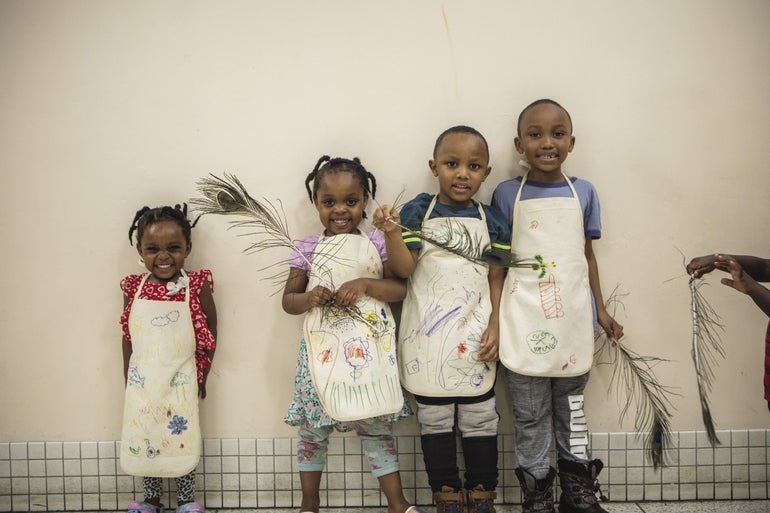ACE purchased the 51 Gage St. building – a former charter school – earlier this year for $1.8 million.
Get Instant Access to This Article
Subscribe to Worcester Business Journal and get immediate access to all of our subscriber-only content and much more.
- Critical Central Massachusetts business news updated daily.
- Immediate access to all subscriber-only content on our website.
- Bi-weekly print or digital editions of our award-winning publication.
- Special bonus issues like the WBJ Book of Lists.
- Exclusive ticket prize draws for our in-person events.
Click here to purchase a paywall bypass link for this article.
Kaska Yawo has always wanted a centralized hub for African Community Education, the nonprofit he founded in Worcester with Olga Valdman in 2006.
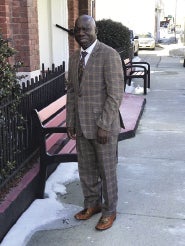
Finally, after about 16 years and thousands of people served, the nonprofit founded to help African immigrants is finally going to have what he’s always dreamt of.
ACE purchased the 51 Gage St. building – a former charter school – earlier this year for $1.8 million, the nonprofit said in January. The property was purchased in cash, thanks to a gift from a private donor Yawo said discovered ACE and wanted to help out. The donor ended up giving a total of $2.8 million to the organization, the biggest single gift in ACE’s history and more than its total fiscal year 2021 revenue of $1.6 million.
The purchase will allow ACE to expand its services beyond Worcester and the surrounding area, increase its legal and translation services, start offering its educational programs for kids as young as third grade, and add new services, including driver education and child care. It will be a place where immigrants and refugees can come for services, or for anyone to get involved with the organization as a volunteer, Yawo said.
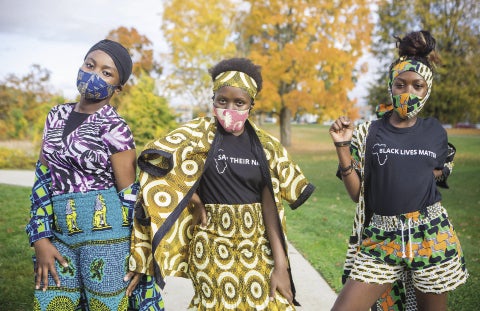
ACE needs to hire building and maintenance staff for the facility, he said, and the nonprofit is seeking donations in order to renovate the building.
“When I founded this organization, we were going from place to place. We haven’t had a permanent space. The public schools have been great to us; but sometimes we want to stay to provide services, but the building is closed,” Yawo said. “It’s been our goal to have our own place, where we will serve the community and where we will call our home.”
How was ACE started?
Yawo is a native of Liberia who lived in refugee camps in three different countries for nine years. He came over with a college degree, but even with all of his accolades, transitioning to the U.S. was quite difficult.
“The system over here is very different, be it culture, be it food, be it community-based gatherings. It all was different,” he said.
While working at the Massachusetts Department of Public Health in Boston, Yawo noticed refugee children who came into the commonwealth were having trouble keeping up with their peers. The dropout rate for students from African was high, he said.
“Take, for example, a child born in a refugee camp, who grew up there for 14 or 15 years. Then put them in the 10th grade, according to their age, or even ninth grade, but the child never had a book, and now has to do algebra and trigonometry. How in the world will that child survive?” Yawo said. “I said, ‘You know what, I will have to put this program together to do an intensive for after school and Saturday school, so that people will be able to help children catch up with their peers.’”
Since its official founding in 2006, ACE has assisted thousands of African families throughout Worcester, and about 300 students have graduated from its program, Yawo said.
The nonprofit offers immigration services, an English as a second language program for families, a mentoring program to help kids build self-esteem, and post-secondary education help, where students get guidance on things like applying to college and financial aid.
ACE offers a workforce development program, which offers kids and adults assistance with applying for new jobs and the opportunity to do outside internships where ACE pays their salaries. Its Saturday program, which is offered concurrent to the school year, features teaching in science, engineering, technology, and math, plus literacy and traditional activities like African dance and drumming.
An outreach program will contact students and their families if a child is struggling in school, and a summer reading program that can be translated to school credit.
To raise money for renovations and an expansion with its new building purchase, ACE will soon launch a capital campaign, with the goal of raising $5 million. Those funds will last the organization a few years, Yawo said.
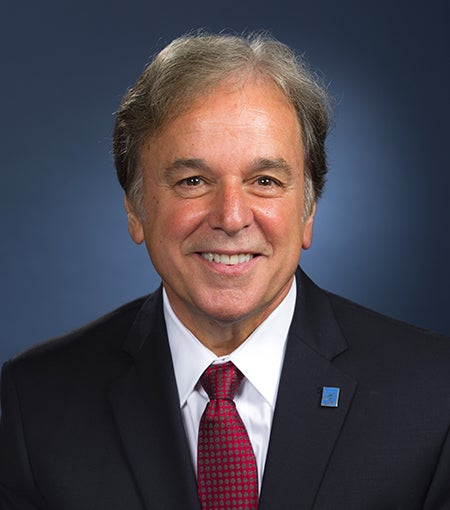
David Jordan, president of the Worcester nonprofit Seven Hills Foundation, said he admires how Yawo and Valdman stepped up and addressed a problem.
“They began this on a shoestring and decided to do something for the benefit of many African immigrants coming to the Worcester community,” Jordan said. “They had the right intention, and they always had the right approach to the work in terms of being selfless givers to people in need.”
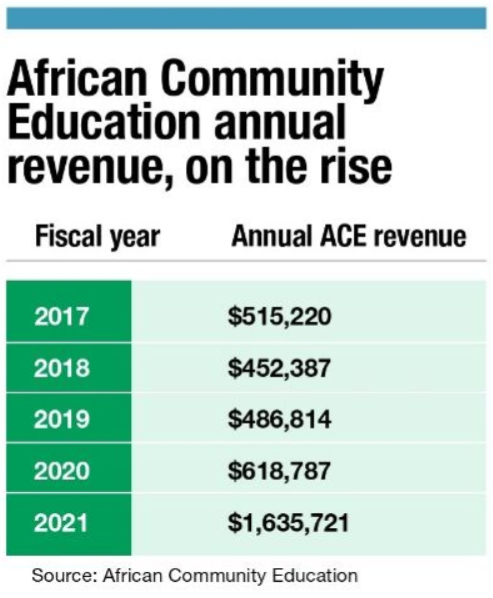
ACE financials and impact
Worcester has been an attractive place for African immigrants and refugees since the early 1990s, according to a 2015 study commissioned by the Seven Hills Foundation.
The study found Worcester was home to 37,970 immigrants from 85 countries, which at the time accounted for 21% of the city’s population. According to ACE, Worcester’s African-born population sits around 20,000.
The city, Yawo said, has a reputation for being a welcoming place for immigrants, which is why there are so many in the area.
“What happens is most times the State Department looks at community-based organizations, community engagement, and also populations that are resettled in those communities,” he said. “They know we get a lot of Somalians, a lot of Cameroonians, and Liberians. If they go to Worcester, it will be easier for them to transition because of the community.”
Between 2016 and 2020, a total of 1,815 African refugees arrived in Massachusetts, according to the Massachusetts Department of Public Health. The Democratic Republic of the Congo had the largest share, with 869 total refugees coming to Massachusetts within that four-year period, DPH data shows.
The Seven Hills study, which was performed by researchers at UMass Dartmouth and the UMass Donahue Institute, found foreign-born people living in Worcester contribute significantly to the local economy.
Naturalized foreign-born residents had the highest median household income ($50,865) of all groups in Worcester, measured against native households ($46,263) and noncitizen households ($37,944). Naturalized foreign-born Worcester residents had higher rates of homeownership than natives and noncitizens.
Noncitizen households are the ones who struggle the most, the study found. Despite having the highest average number of workers per household, they earn less than native and other foreign-born households.
They’re also the most likely to live in poverty.
About 30% of African-born immigrants and their children living in Worcester live within 200% of the poverty line, according to ACE. The organization says on its website it serves only about 6.3% of those people, leaving 5,000 in critical need.
Fundraising for its new home
The nonprofit’s planned capital campaign has a fundraising goal of $5 million, with its annual gala in October.
ACE’s revenue went up significantly in 2021, jumping from $618,787 in fiscal year 2020 to $1,635,721 last year.
Running a nonprofit and keeping it financially stable is not a simple task, Jordan said. In his experience, raising money for a capital project is the easy part, because donors will often give a one-off gift as part of a capital campaign.
The difficult part comes in sustaining the ongoing costs of running a charity, Jordan said. It’s important to create funding streams – like social enterprises – to make some money for the nonprofit. Seven Hills has that sort of relationship with its architectural firm, Group 7 Design, he said.
“I teach social entrepreneurship at Clark [University] and I always tell my students, ‘Charity is not sustainable’ unless you have donors that assure you that they’re going to make a donation every month, or on a regular ongoing basis,” he said. “Trying to create other funding streams or mechanisms becomes an important part of any nonprofit entity.”
